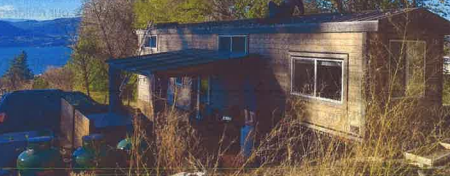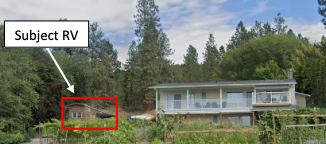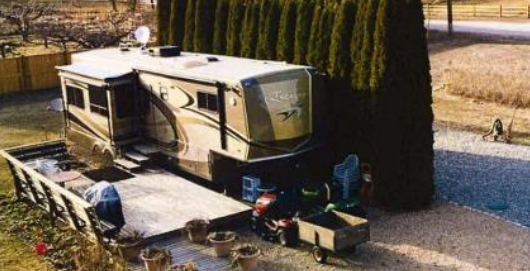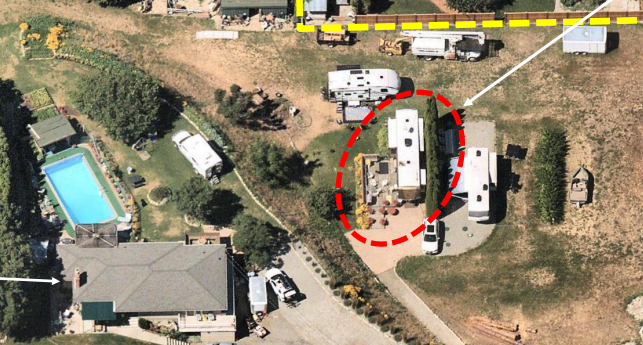2024 FEB 19 update:
2024 FEB 15 Castanet | Blew Him Back 10 Feet
2024 FEB 14 Western | Strings attached to Naramata RDOS Director's tiny home
2024 FEB 09 update
2024 FEB 03
First, the Herald's article is a reasonably accurate title. I am concerned with how many RVs have been granted year-round occupancy in the last eight to nine months. More concerning is that none of those permits require the property owner (who owns the property and is likely collecting rent from their RV tenants) to meet any minimum health and safety standards recommended by RDOS staff or Interior Health.
This is a complex issue and a relatively long post. I want to remind readers that these opinions are mine, are not endorsed by the RDOS, and are not intended in any way to represent the RDOS as a corporation or any of the RDOS Directors.
Finally, I am not opposed to discussing the role of year-round occupancy for RVs. However, I want that discussion to be public, with constituents, and with all available information.
Temporary Use Permits (TUPs) allow the RDOS board to authorize a use to occur temporarily in a zone where the use is usually not permitted. Some examples are building a shed before the main home is constructed or increasing the number of livestock allowed on a property. TUPs cannot exceed three years but may be renewed for up to three years. More info on how TUPs are used for short-term rentals here.
Context to the Penticton Herald article:
The January 18 Board meeting was incredibly awkward because the board was discussing a TUP for year-round occupancy for Director Fedgrio (Area E/Naramata).
RDOS Directors are policymakers - that is the job. Directors set policy and (should) follow policy.
When the board approves multiple policy variances, pausing to test that policy's relevance is always a good idea and enhances public engagement.
In my opinion, when a permit is issued to an elected official, a strong message is delivered to citizens.
It wasn't the seventh application for year-round occupancy of an RV. It was the fourth application. One application was for four (4) RVs, hence the 'seventh' RV seeking a permit. More on the recent applications below.
Last term, the RDOS board:
spent a better part of two years discussing the parameters (land size, maximum units, unit size, etc.) for zoning metal storage containers. Citizens were very engaged in this discussion; I believe citizens will want to weigh in on RV occupancy.
Updated the Okanagan Zoning Bylaw to allow RV storage of one unit with guests permitted to stay for a maximum of 90 days.
The two requests for Area E are for three-year TUPs with the option to renew for another three years.
Year-round RV living for three to six years is a significant land use change.
Do citizens consider six years of year-round RV occupancy temporary?
Since May 2023, the following TUPs for year-round RV living have been granted:
in an area with a hazard land designation that restricts density and without the Area Director's support (Greater West Bench/Area F),
in an area with known water scarcity issues, zoning that restricts density, and without the Area Director's support (Faulder/Area F),
and for four (4) RVs with plywood modifications, wood stoves, and lack of septic system, with the Area Director's support (Chute Lake/Area E) and now,
for an RV (cladded with a deck and skirting) on a property that doesn't permit accessory dwellings with the Alternate Director's support (Naramata/Area E), as this TUP was for the Area's Director.
There is a quote in the article from a fellow director who says: "Here is a tiny house, built to RV standards so that they can have certification.... and it's (the RV) in Naramata - where we (the Board) have been approving things like this time and time again."
Besides the four RVs permitted for Chute Lake last November, I can only find one TUP for an RV on the RDOS website for Naramata/Area E. The applicant was caring for an aging parent while the parent waited for a long-term care bed.
Tiny Houses are not defined in any RDOS policy.
The BC Ministry of Housing does not limit how small a home can be built as long as it meets the minimum standard for protecting people and the environment (BC Building Code).
"Tiny Homes," "RVs," and "Accessory Dwellings" cannot be used interchangeably.
According to the Canadian RV Association, Tiny Homes are not Recreational Vehicles.
MORE INFORMATION on TUPs GRANTED for YEAR-ROUND OCCUPANCY of RVs since May 2023.
All this information is public, and more details are available through the links and RDOS website.
Update: at the Feb. 8, 2024, Board meeting, the Chair asked that the TUP issued on Jan. 23, 2024, be reconsidered. Director Fedrigo recused herself from this debate as the TUP is for her parent's property and accessory dwelling. The TUP was passed for three years with the following conditions.
CONDITIONS OF TEMPORARY USE
7. The accessory dwelling use of the land is subject to the following conditions: The accessory dwelling shall be in the form of a Canadian Standards Association Z- 240-RV model recreational vehicle; The accessory dwelling shall be connected to a community water system;
The accessory dwelling shall be located 1.52 metres from the north interior side parcel line and 3 metres from the rear parcel line in accordance with Schedule ‘B’. Within 6 months of approval of this permit, the applicant must confirm compliance with the Sewerage System Regulation to the satisfaction of the Regional District by submitting one of the following: i. Records of the Filing and Letter of Certification for the existing sewerage disposal system serving the RV confirming that the existing sewerage dispersal system has adequate performance, condition, size and location for the intended use in accordance with Section 7.2 of the Onsite Wastewater Certification Board Policy: APPENDIX 2, Registered Onsite Wastewater Practitioner (ROWP) Practice Guidelines, or; ii. If Filing documents cannot be produced, record of a Compliance Inspection completed by an Authorized Person confirming that the current sewerage disposal system can handle the flow and volume produced by the RV, that it does not pose a health hazard and that it is in conformance with the standards of the Sewerage System Standard Practice Manual, Version 3.
At the January 23 Board meeting, the Board approved a three-year Temporary Use Permit (TUP) for year-round occupancy of a CSA Z240-RV. This property is not permitted to have an accessory dwelling (it is not large enough and is not on a community sewer system). Without community sewer, the permit has possibly put the RDOS in contravention of the Okanagan Water Basin Board's 1.0-hectare policy. The RV does not meet BC's Sewerage System Regulation and Building Code.
On November 16, 2024, the Board granted a three-year Temporary Use Permit for year-round occupancy of four (4) Recreational Vehicles on one property. The property is zoned for one principal dwelling and two accessory dwellings (carriage houses or suites).
From the permit application:
The RVs have been lived in for several years.
Each trailer has a 15 amp electrical service and a waterline.
There is an outhouse for black water.
Each RV has a small gray water pit for domestic sewage created by the water brought into the RVs.
Residents can use the main house to shower.
The general concern from the Board was that citizens would be unhoused in November (the beginning of winter). I didn't disagree. I would have been open to further discussion of a one-year TUP permit that ensured that the property owner (the one who is likely receiving rent from the tenants) reasonably followed the health and safety recommendations of Interior Health and the conditions in the permit (potable water, washrooms and cooking facilities be provided in the principal housing). Instead, the property owner was granted a three-year TUP with no conditions.
At the same November 16 meeting, the Board approved a one-year TUP for an RV in Faulder/Meadow Valley. As per the application, the RV tenant can access washroom facilities and potable water in the main house. The RV will have electricity from the main house.
A concern of this application is that the home is within the Faulder Water System, which has known water scarcity. Residents on this water system just went through a comprehensive review, resulting in changes to bylaws to limit density. So, while one RV seems insignificant, the collective impact on water resources and incremental development of inadequate housing, over time, will erode and undermine the area's land use priorities.
In May 2023, the Board approved the year-round occupancy of an RV in Greater West Bench. This RV had a deck and skirt, was connected to water, and had a separate (unpermitted) septic system. This permit was rescinded (removed) at the next Board meeting. Greater West Bench has bylaws which have been in place for decades that limit density by restricting the number of dwelling units (carriage houses and secondary suites) due to the geotechnical hazards of the area.
Thank you for reading.
If you have any questions or comments, please let me know.
Riley
Director for Area F
250-488-0246






















Comments